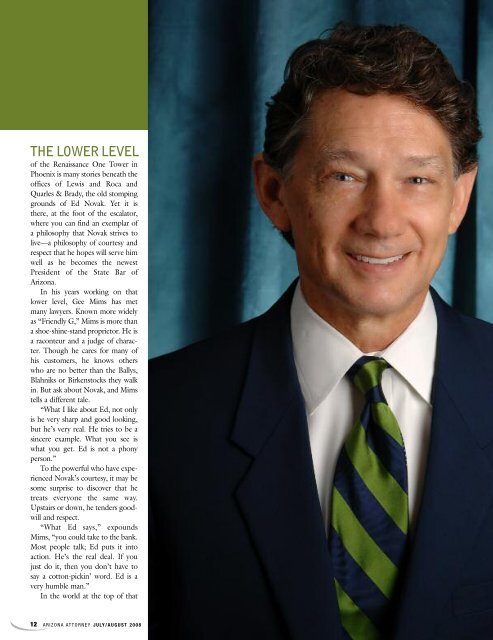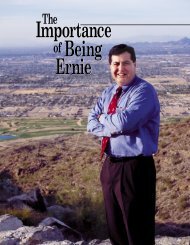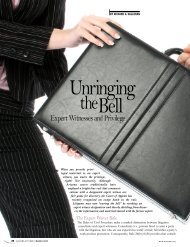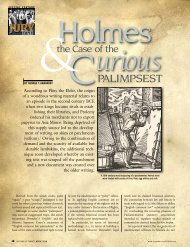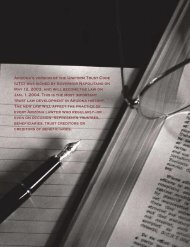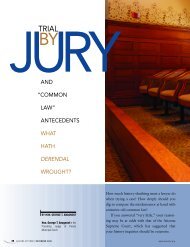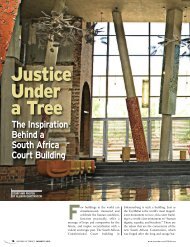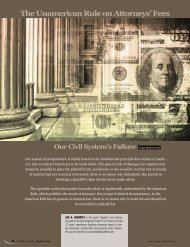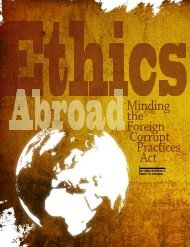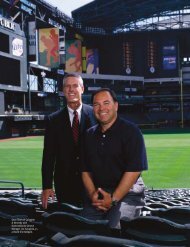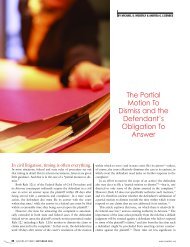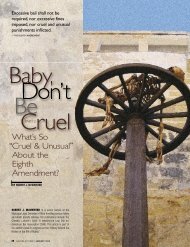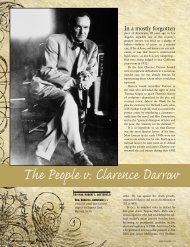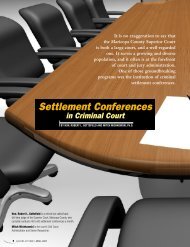New Bar President Ed Novak - Lawyers
New Bar President Ed Novak - Lawyers
New Bar President Ed Novak - Lawyers
Create successful ePaper yourself
Turn your PDF publications into a flip-book with our unique Google optimized e-Paper software.
THE LOWER LEVEL<br />
of the Renaissance One Tower in<br />
Phoenix is many stories beneath the<br />
offices of Lewis and Roca and<br />
Quarles & Brady, the old stomping<br />
grounds of <strong>Ed</strong> <strong>Novak</strong>. Yet it is<br />
there, at the foot of the escalator,<br />
where you can find an exemplar of<br />
a philosophy that <strong>Novak</strong> strives to<br />
live—a philosophy of courtesy and<br />
respect that he hopes will serve him<br />
well as he becomes the newest<br />
<strong>President</strong> of the State <strong>Bar</strong> of<br />
Arizona.<br />
In his years working on that<br />
lower level, Gee Mims has met<br />
many lawyers. Known more widely<br />
as “Friendly G,” Mims is more than<br />
a shoe-shine-stand proprietor. He is<br />
a raconteur and a judge of character.<br />
Though he cares for many of<br />
his customers, he knows others<br />
who are no better than the Ballys,<br />
Blahniks or Birkenstocks they walk<br />
in. But ask about <strong>Novak</strong>, and Mims<br />
tells a different tale.<br />
“What I like about <strong>Ed</strong>, not only<br />
is he very sharp and good looking,<br />
but he’s very real. He tries to be a<br />
sincere example. What you see is<br />
what you get. <strong>Ed</strong> is not a phony<br />
person.”<br />
To the powerful who have experienced<br />
<strong>Novak</strong>’s courtesy, it may be<br />
some surprise to discover that he<br />
treats everyone the same way.<br />
Upstairs or down, he tenders goodwill<br />
and respect.<br />
“What <strong>Ed</strong> says,” expounds<br />
Mims, “you could take to the bank.<br />
Most people talk; <strong>Ed</strong> puts it into<br />
action. He’s the real deal. If you<br />
just do it, then you don’t have to<br />
say a cotton-pickin’ word. <strong>Ed</strong> is a<br />
very humble man.”<br />
In the world at the top of that<br />
12 A R I Z O N A AT T O R N E Y J U LY / A U G U S T 2 0 0 8
BY TIM EIGO<br />
Word on the Street<br />
NEW BAR PRESIDENT ED NOVAK<br />
escalator, where legal professionals<br />
wield their own brand of Shinola,<br />
<strong>Novak</strong>’s reputation is similarly burnished.<br />
Through effort and example,<br />
he has come to be seen as a<br />
straight-shooter.<br />
Peter Sexton, an Assistant U.S.<br />
Attorney for the District of<br />
Arizona, calls <strong>Novak</strong> “a very effective<br />
defense lawyer. I trust what he<br />
tells me.”<br />
Judge Sherry Stephens knew<br />
<strong>Novak</strong> when she was a prosecutor,<br />
and she agrees.<br />
“I loved having cases opposite<br />
him. When he told you something,<br />
you knew it was the truth. If he told<br />
you he would do something, you<br />
knew he would follow through.”<br />
At its heart, <strong>Novak</strong>’s philosophy<br />
seems comprised of equal parts<br />
honest discourse and an almost<br />
populist empathy for hard work and<br />
respect for those who do it.<br />
Those were values instilled in<br />
him when he was raised in the<br />
Chicago suburb of Berwyn, values<br />
that have informed his later choices.<br />
It was on that path from Illinois<br />
that he more than once experienced<br />
a disconnect from those around<br />
him, a sense of peering in even as he<br />
participated. Thus, even today’s<br />
consummate legal insider often<br />
appears an observer, a man apart.<br />
Perhaps that disconnect grew to<br />
be strongest in Vietnam.<br />
If there was anything that tested<br />
<strong>Novak</strong>’s values and dropped him<br />
wholesale into a surreal environment,<br />
it was 1969, the year he was<br />
drafted by the U.S. Army. Sixteen<br />
days after graduating from Knox<br />
College in Illinois, he was in Fort<br />
Dix, <strong>New</strong> Jersey.<br />
Here is how <strong>Novak</strong> speaks<br />
about Vietnam: haltingly. He will<br />
discuss it when asked, but he speaks<br />
and then pauses, then plunges<br />
ahead with an anecdote, then grows<br />
silent again. He is a man who typically<br />
weighs each word carefully.<br />
But on the topic of war, his weighing<br />
is done as on a precision instrument.<br />
Probably not much different,<br />
one would guess, from the way<br />
other combat veterans speak of the<br />
experience.<br />
It was in basic training, <strong>Novak</strong><br />
says, that he first encountered the<br />
surreal nature of being in an organization<br />
that controls your entire<br />
reality. Early into his training, the<br />
lunar module landed on the moon.<br />
“Without explanation,” says<br />
<strong>Novak</strong>, “we’re all suddenly<br />
marched into this giant field house<br />
with TVs all around. We sit down<br />
and with no explanation we’re<br />
watching Neil Armstrong land on<br />
the moon. I’ve got to tell you:<br />
Most of us were trying to sleep. We<br />
understood the significance of it,<br />
but we also understood that this<br />
was an opportunity to close your<br />
eyes.”<br />
And other events baffled and<br />
defied definition.<br />
“We heard about Woodstock,<br />
but it has no meaning when you’re<br />
in basic training: ‘What do you<br />
mean they’re out smoking dope<br />
and listening to music? I’m polishing<br />
shoes.’”<br />
Though his mother counseled<br />
that he could move to Canada and<br />
live with an uncle—a path <strong>Novak</strong><br />
rejected—he did inquire of the<br />
draft board about different alternatives.<br />
“I talked to them about the<br />
Peace Corps. ‘No.’ A master’s program<br />
in Liberia in teaching for two<br />
years? ‘No.’ Law school?<br />
‘Absolutely not.’”<br />
“Essentially, it was, ‘We need the<br />
bodies, and you’re the body.’”<br />
<strong>Novak</strong>’s body was put to work<br />
as a combat engineer. Acting as<br />
“the infantry for the construction<br />
engineers,” they did everything<br />
from demolition, to exploding<br />
unexploded ordnance, to building<br />
bridges, to providing security during<br />
construction.<br />
If the engineers were building<br />
things that the Viet Cong and the<br />
North Vietnamese Army wanted—<br />
like roads—they left them alone.<br />
But if they were building a special<br />
forces camp or another military<br />
installation, “They took it out on<br />
us.”<br />
And then there was “tunnel<br />
eradication.” <strong>Novak</strong> pauses nervously<br />
and longer than usual before<br />
he says, “That’s a fun job. God<br />
decided I was not going to be a tall<br />
individual, but what God failed to<br />
tell me was that short guys go down<br />
tunnels.”<br />
“You’re armed with a flashlight<br />
and a .45; I don’t know about you,<br />
but I can’t hit anything with a .45.<br />
And the flashlight only pointed out<br />
where you were.”<br />
Above or below ground, <strong>Novak</strong><br />
came to a revelation.<br />
“The Vietnamese weren’t giving<br />
up. They knew they were in this<br />
battle until they won, and they<br />
knew we were in this battle until we<br />
rotated back to the United States<br />
and got to go home. It made all the<br />
J U LY / A U G U S T 2 0 0 8 A R I Z O N A AT T O R N E Y 13
NEW BAR PRESIDENT ED NOVAK<br />
difference in the world.”<br />
<strong>Novak</strong> speaks frankly and at<br />
length about his service, about<br />
his return home and finishing<br />
out his Army career. It is only<br />
then, when his stories are safely<br />
back on American soil, that he<br />
relates an incident at a Japanese<br />
refueling stop on the way to<br />
Vietnam, where the new soldiers<br />
mingled with those boarding<br />
planes to return home.<br />
“I didn’t know what PTSD<br />
was,” says <strong>Novak</strong>, his voice<br />
dropping, “but I think I saw it<br />
on those faces. We had an<br />
expression—the thousand-yard<br />
stare—and I didn’t see one guy<br />
in that hangar that didn’t have a<br />
thousand-yard stare. If I wasn’t<br />
scared before then, I was real<br />
scared at that point.”<br />
On their next leg to an airfield<br />
outside Saigon, under rocket<br />
attack, they made “the hardest<br />
landing I’ve ever had.” Even<br />
more disturbing, the new soldiers<br />
saw out their windows U.S.<br />
G.I.s shaking their fists in the air<br />
and shouting at the plane. When<br />
the doors opened, they could<br />
finally hear: “GET. OFF. MY.<br />
AIRPLANE.” The weary and<br />
bedraggled soldiers were desperate<br />
to put Southeast Asia behind<br />
them.<br />
Almost as an afterthought,<br />
<strong>Novak</strong> recalls how he dealt with<br />
his time there.<br />
“I think I survived mentally<br />
because I didn’t make any close<br />
friends. I didn’t want to make<br />
any close friends; they might not<br />
be around tomorrow. I protected<br />
myself by—the expression<br />
was “numbing out.”<br />
“When I got home, I spent<br />
my 30-day leave at my parents’<br />
house and stayed in my room.”<br />
He pauses again. “I don’t think<br />
I went out.”<br />
Finally, <strong>Novak</strong> muses on the<br />
bigger picture.<br />
“I didn’t understand why we<br />
were involved in that war. I<br />
knew what the government was<br />
saying, but it just didn’t sound<br />
all that logical.”<br />
“<strong>Ed</strong> doesn’t clamor for the<br />
camera, but he’s not afraid of it<br />
if they stick a microphone in his<br />
face. He’s a cool cucumber.”<br />
Now 60, the experienced<br />
lawyer looks back almost 40<br />
years: “Now we would say I<br />
believed in the rule of law. But I<br />
believed in a democratic government,<br />
and I knew I could vote<br />
for people who opposed the war,<br />
but that it was not my role as a<br />
voter in a democratic government<br />
to say anything more than<br />
‘I’m not going to vote for you.’<br />
When the government says, ‘We<br />
need you to serve,’ you serve.<br />
Period.”<br />
How did those experiences<br />
shape him?<br />
“It really does drive who I<br />
am. I don’t get mad about<br />
things; I don’t let things bother<br />
me. My expression is, ‘If<br />
nobody’s shooting at me, it’s<br />
not an emergency.’ My military<br />
experience left me with the<br />
knowledge that I can work<br />
myself through an emergency.”<br />
<strong>Novak</strong> is known as an attorney<br />
who prepares extensively—<br />
belt and suspenders, you could<br />
say—but who also is adept at<br />
addressing the random acts that<br />
pepper a law case. Similar to his<br />
Army service?<br />
“You prepare for everything<br />
you can possibly prepare for,”<br />
says <strong>Novak</strong>, “and then you<br />
understand that preparation is<br />
different from control. You can<br />
be fully prepared, but you cannot<br />
have complete control.<br />
Those are competing impulses.”<br />
Does that understanding<br />
serve lawyers and bar presidents<br />
well? Rick Romley thinks so.<br />
A former Maricopa County<br />
Attorney and a Vietnam veteran<br />
himself, Romley says that <strong>Novak</strong><br />
“has a unique ability to see big<br />
pictures.”<br />
“<strong>Ed</strong> is the right person at the<br />
right time. He will bring some<br />
unique skill sets for challenging<br />
times for the State <strong>Bar</strong>. <strong>Ed</strong> is an<br />
anchor for a ship in a very rocky<br />
sea right now. He’ll be able to<br />
stabilize a lot of the difficult<br />
problems that exist out there in<br />
the legal profession.”<br />
“This is when your leaders<br />
emerge. The <strong>Bar</strong> will be stronger<br />
after <strong>Ed</strong> finishes his term.”<br />
“Disconnect” may not be too<br />
strong a word to describe <strong>Novak</strong><br />
when he returned to the States<br />
and entered law school at<br />
DePaul. His older status and distinct<br />
experience led him to be<br />
more “among” his fellow students<br />
than “with” them.<br />
At school, he was the “old<br />
man,” 25 or 26 years old. And<br />
though his fellow male students<br />
were much younger, the female<br />
students were about his age.<br />
<strong>Novak</strong> says that the women<br />
were on the “militant” side. In<br />
his first Property class, some<br />
women protested use of the text<br />
because it was chauvinistic. That<br />
was new to the Berwyn boy<br />
trained in the Army. He had no<br />
experience seeing people buck<br />
authority like that.<br />
“What was going on while I<br />
was gone?” he thought. “What<br />
happened?”<br />
But the more <strong>Novak</strong> reflected,<br />
the more he thought, “This<br />
is good. I was glad to see the<br />
women were standing up for<br />
themselves.”<br />
When the male students disagreed,<br />
he pointed out this is<br />
what the law is all about.<br />
“If you don’t want to challenge<br />
things, if you don’t want to<br />
test the status quo, you really<br />
need to find another profession.<br />
This is what standing up for other<br />
people’s rights is all about.”<br />
And so the 1970s went.<br />
<strong>Novak</strong>’s education progressed,<br />
and he recalls, “I felt like I got to<br />
be an observer in the early part<br />
of the significant change in law<br />
school enrollment from completely<br />
male dominated to half<br />
men half women, and accomplishments<br />
being made in the<br />
curriculum because women had<br />
a say in their education, and that<br />
say needed to be heard.”<br />
How a person becomes who<br />
they are is one of the great mysteries.<br />
But <strong>Novak</strong>’s inclusive<br />
thinking did not begin in<br />
Property I. It began with his<br />
choice of college, and it continues<br />
to his activities on the Board<br />
of Governors.<br />
A small liberal-arts school on<br />
the western Illinois prairie, Knox<br />
College was established in 1837<br />
by abolitionists, and women and<br />
people of all races were welcome<br />
at the school. Trustees included<br />
those actively involved in the<br />
Underground Railroad, on which<br />
Galesburg, Ill., was a “stop.”<br />
That progressive spirit is no<br />
mere historic artifact. Its own<br />
official history includes the fact<br />
that, in 1970, “protesting the<br />
war in Vietnam, students occupy<br />
Old Main.” In 2005—the same<br />
year Sen. <strong>Bar</strong>ack Obama delivered<br />
its commencement<br />
14 A R I Z O N A AT T O R N E Y J U LY / A U G U S T 2 0 0 8<br />
w w w. m y a z b a r. o r g
NEW BAR PRESIDENT ED NOVAK<br />
address—Knox eliminated standardized<br />
test scores as an admissions<br />
requirement.<br />
<strong>Novak</strong> recalls that he and<br />
others “deactivated” from his<br />
fraternity over an issue of discrimination.<br />
His Knox chapter<br />
sought to pledge an African-<br />
American student, but the<br />
national organization rejected<br />
the pledge, invoking a “compatibility<br />
clause.” The chapter<br />
protested that this conflicted<br />
with the Knox anti-discrimination<br />
policy, and members<br />
resigned from the fraternity. In<br />
fact, when word got out, members<br />
going as far back as the class<br />
of 1906 deactivated.<br />
<strong>Novak</strong> says, “So the fraternity<br />
had a small piece in adding to<br />
the college’s history: It solidified<br />
the administration’s position<br />
in regard to discrimination<br />
in fraternities and sororities. It<br />
made everyone much more conscious<br />
of how invidious discrimination<br />
can be.”<br />
In March of this year, he saw<br />
himself in another battle against<br />
discrimination, when the <strong>Bar</strong>’s<br />
board considered opposing a<br />
statewide ballot initiative that<br />
would preclude the consideration<br />
of race in certain instances. For<br />
<strong>Novak</strong>, the decision was highly<br />
charged, and very personal.<br />
At the board meeting, he<br />
asked to be recognized last. He<br />
spoke quietly about the bigoted<br />
views of his own father and others<br />
he had known. Board members<br />
sat transfixed as he<br />
described that his father’s views<br />
had not altered over a lifetime,<br />
even as he now lay dying in an<br />
Illinois care center. As he spoke,<br />
<strong>Novak</strong> suspected he had visited<br />
his dad for the last time. This private<br />
man reflected publicly on<br />
his own family and why he<br />
developed the views he held.<br />
The board voted to oppose<br />
the initiative. <strong>Novak</strong>’s father<br />
passed away 17 days later.<br />
His presentation was undeniably<br />
moving. But <strong>Novak</strong> also exhibits<br />
a strong strategic sense.<br />
He acknowledges, “You need<br />
to develop a strategy to get<br />
things done. You cannot simply<br />
wake up one morning with an<br />
idea and run down to the meeting,<br />
where there are 26 members<br />
and 37 different views on every<br />
subject, and expect to get that<br />
approved.”<br />
“There is a fair amount of<br />
management—of issues and of<br />
expectations. I’m not embarrassed<br />
by that fact.”<br />
A college professor admires<br />
<strong>Novak</strong> and sees in him the<br />
accomplished strategist.<br />
“I think <strong>Ed</strong> is intuitively very<br />
political, and I mean that in a<br />
positive way,” says Robert<br />
Siebert, a Knox Professor of<br />
Political Science and<br />
International Relations. “He can<br />
define his objectives clearly, he<br />
knows how to go after them,<br />
and he has the kind of persona<br />
and organizational skills that will<br />
transfer nicely” into his job as<br />
president.<br />
That strategic and agile<br />
thinking must come at least in<br />
part from his practice in whitecollar<br />
criminal defense. He has<br />
to think on his feet, or else he’ll<br />
be knocked back on his heels.<br />
A small sampling of <strong>Novak</strong>’s<br />
case subjects includes: baseball<br />
steroids, aircraft landing systems,<br />
airbags, online pornography and<br />
computer forensics, steel mills<br />
and orthopedic surgery.<br />
The case variety pleases<br />
<strong>Novak</strong>: “It satisfies my curious<br />
mind.”<br />
In <strong>Bar</strong> work, he’s headed up<br />
the Professionalism Task Force<br />
and served on the Ethical Rules<br />
Review Group. If you try to tell<br />
lawyers what is ethical, or that<br />
they no longer can be “zealous,”<br />
you’d better have a strategy.<br />
In all those roles, <strong>Novak</strong> has<br />
become adept at crisis management.<br />
He gives advice that all<br />
leaders should heed: “It’s so easy<br />
to think the right thing and say<br />
the wrong thing.”<br />
Judge Warren Granville, who<br />
met <strong>Novak</strong> when the judge was<br />
a prosecutor, agrees.<br />
“<strong>Ed</strong> doesn’t clamor for the<br />
camera, but he’s not afraid of it<br />
if they stick a microphone in his<br />
face. He’s a cool cucumber.” He<br />
adds, “He’s everything that’s<br />
good about the profession.”<br />
Judge Sherry Stephens says,<br />
“He doesn’t speak from the hip.<br />
He always thinks about what his<br />
position should be. And if he<br />
doesn’t know, he’ll tell you.”<br />
<strong>Novak</strong> may need all his skills in<br />
the next year, as he shepherds his<br />
association goals to completion.<br />
He’d like to locate a more<br />
permanent funding mechanism<br />
for legal aid, and he says the <strong>Bar</strong><br />
may propose a rule with respect<br />
to cy pres funds—money left over<br />
after class action settlements—<br />
and other money escheated to<br />
the state. He also wants to help<br />
lawyers with disabilities find<br />
jobs. Finally, he’d like the <strong>Bar</strong> to<br />
examine how to provide members<br />
malpractice insurance coverage<br />
at good rates.<br />
<strong>Novak</strong> says, “Any lawyer not<br />
insured leaves potential consumers<br />
unprotected.”<br />
Friends and colleagues look forward<br />
to <strong>Novak</strong>’s term.<br />
Jordan Green, now at Perkins<br />
Coie, hired <strong>Ed</strong> when he first<br />
moved to Phoenix in 1979, and<br />
says, “<strong>Ed</strong> is a good listener, a guy<br />
who tries to find a way to<br />
accommodate the wishes and<br />
desires of competing factions.<br />
He’ll do a terrific job.”<br />
Others agree that his term<br />
will be characterized by courtesy.<br />
Phoenix lawyer Treasure Van<br />
Dreumel says, “<strong>Ed</strong> <strong>Novak</strong> personifies<br />
the ability to recognize<br />
and resolve our differences with<br />
discussion and reason in a dignified<br />
and always professional<br />
manner. I think he is exactly<br />
what we need right now.”<br />
Andy Sherwood, a partner at<br />
Quarles & Brady, adds, “<strong>Ed</strong> has<br />
conducted himself with the<br />
greatest degree of professionalism<br />
in some of the most difficult<br />
and high-profile cases in Arizona.<br />
I am proud to be part of a bar<br />
where he will be the president.”<br />
As befits <strong>Novak</strong>’s approach,<br />
nonlawyers also speak well of<br />
him.<br />
Mary Kelly is his longtime<br />
investigator at Joseph, Daniel &<br />
Meyer, Inc. in Phoenix. Without<br />
hesitation, she calls him “my<br />
hero.”<br />
“<strong>Ed</strong> <strong>Novak</strong> is so bright, and<br />
so careful and so incredibly ethical.<br />
People trust him; he’s regular<br />
and honest. If he gives you<br />
his word, it’s his word.”<br />
She says that, like her, bar<br />
members will “marvel at his fairness,<br />
his temperament.”<br />
Maybe so, but <strong>Novak</strong>’s enduring<br />
pride is at home. His wife<br />
Heather is a former teacher, and<br />
they have twin daughters, Claire<br />
and Riley, who are 5 and a half<br />
years old.<br />
“The greatest leveling device<br />
for me is my girls. I think that’s<br />
true of every parent: You’re a<br />
real big shot until you go home<br />
and talk to your kids, and then<br />
you find out just how unimportant<br />
you are, or how easily dismissed<br />
you are.”<br />
“I think my girls are great,<br />
but they can ignore me with the<br />
best of them. And I like that.”<br />
<strong>Novak</strong> also has two sons,<br />
aged 36 and 30, from his first<br />
marriage. “My family is the most<br />
important aspect of my life, bar<br />
nothing else.”<br />
The careful <strong>Novak</strong> answers<br />
quickly when asked what he<br />
would be if he weren’t a lawyer.<br />
“The only thing that I can<br />
think of is the burden we all<br />
carry, and that’s to be a better<br />
AZ<br />
parent.” AT<br />
16 A R I Z O N A AT T O R N E Y J U LY / A U G U S T 2 0 0 8 w w w. m y a z b a r. o r g


